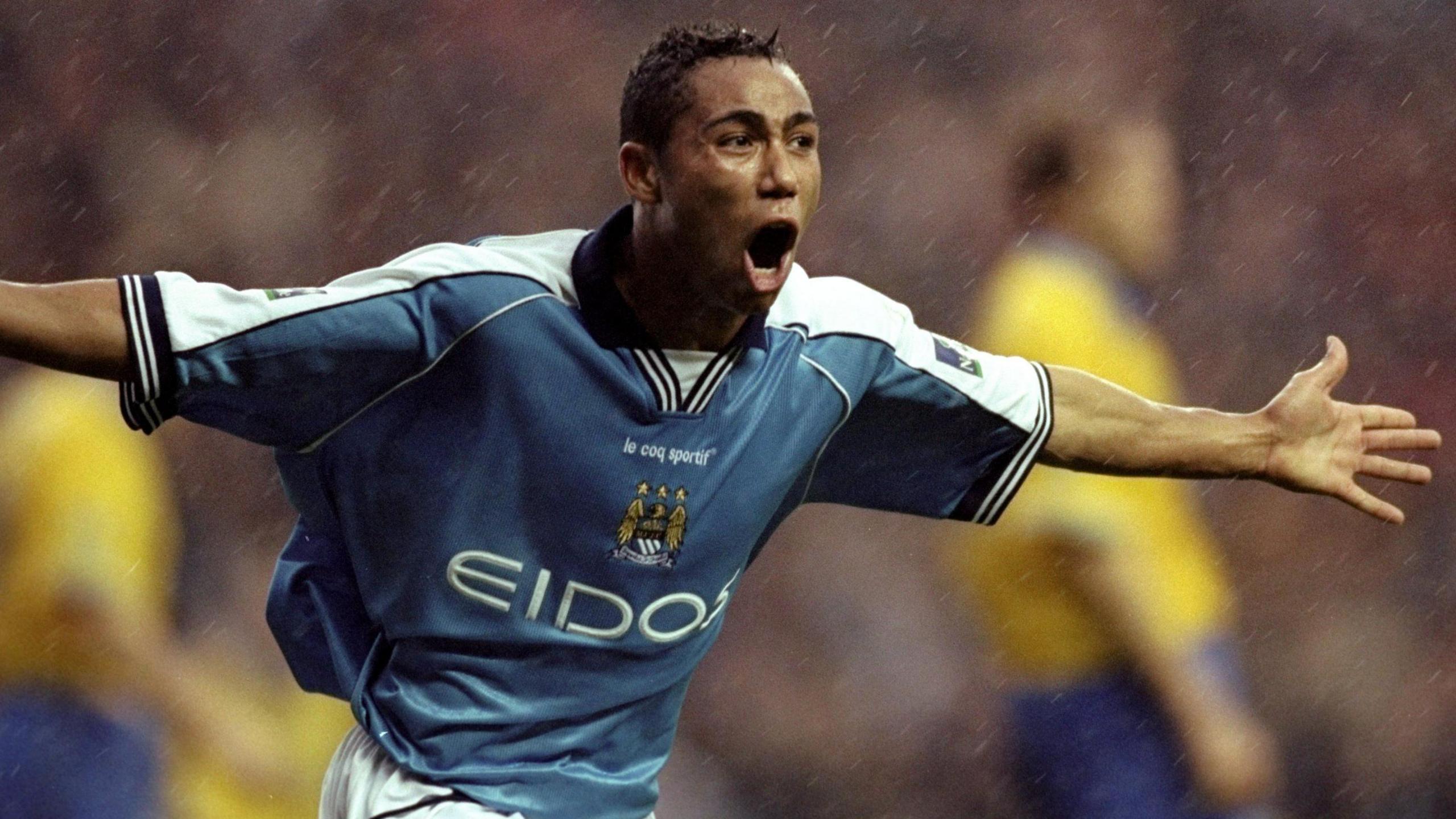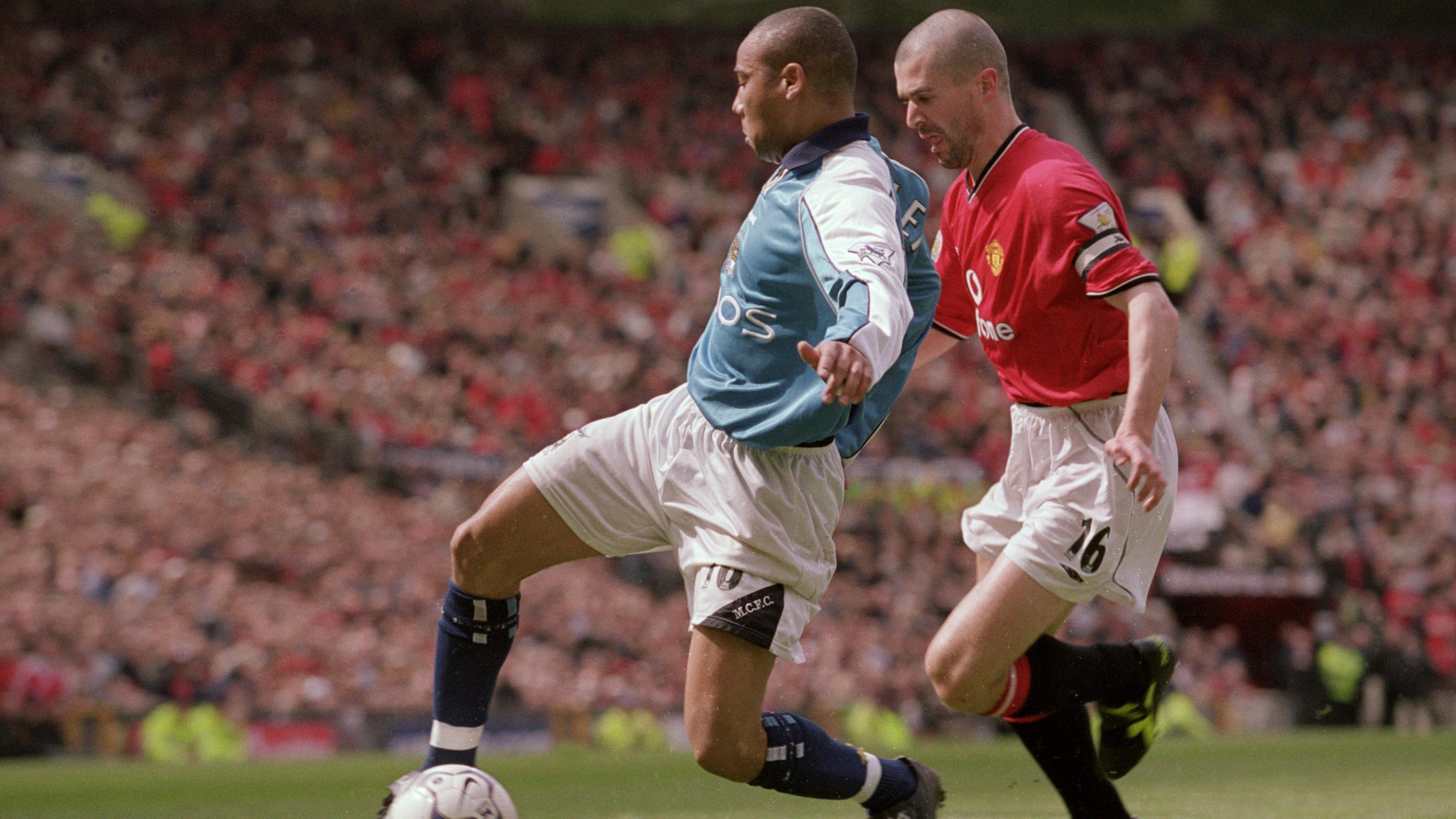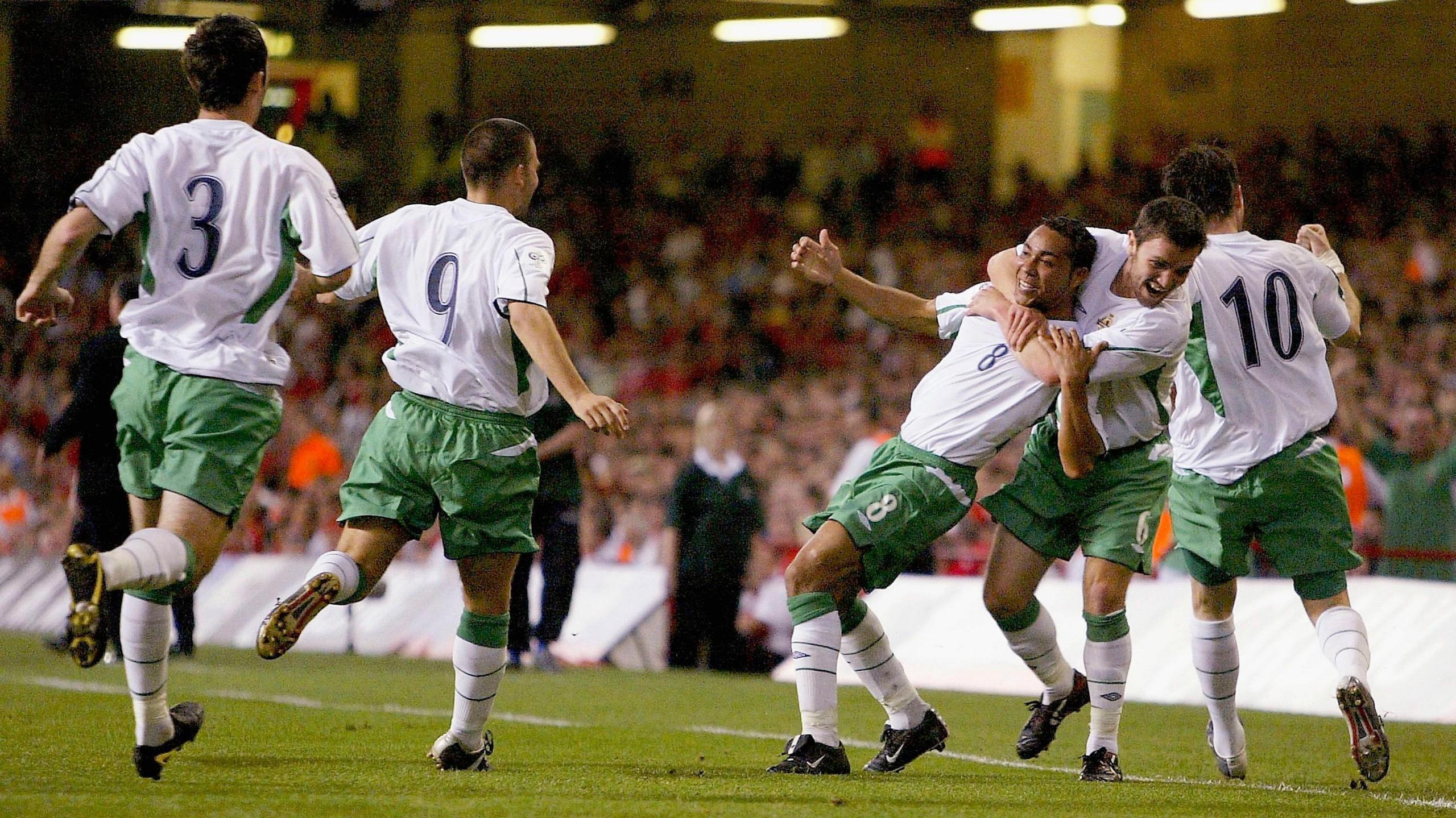'I had two options - pick up the phone or maybe die'

Whitley won 20 caps for Northern Ireland between 1997 and 2005
- Published
"I had two choices. I either keep doing what I’m doing and maybe die, or I pick up the phone and ask for help."
Jeff Whitley's story is not one of despair, but of hope.
The 45-year-old played for a host of big clubs in the Premier League and Championship, such as Manchester City and Sunderland, as well as earning 20 international caps for Northern Ireland.
But behind the scenes, battles with alcohol and drugs led to problems off the pitch, including bankruptcy and a spell in rehab.
Now in a position to help others, this is his story of coming back from the brink.
____________________________________
After coming through the club's academy, it was at Manchester City where Whitley made his name.
He says he "did everything right" to break into the first team at City, but things started to unravel off the pitch.
"Once I started to establish myself in the first team, there was almost a bit of a shift where you almost become unteachable and think you know what is best for you.
"There was a drinking and partying culture and I got sucked into that too much."
Whitley says he was looking at some of the older professionals, and "you think it is okay because they are doing it".
He admitted that following the wrong crowds, both in and out of football, was having an impact on both his life and career.
"Nearly every club had moved me on because of the off the pitch antics. Not being able to keep it together or not understand to say no to some of the times I went out.
"Man City basically ate me up because of my off the pitch stuff. I had got warned a number of times about it.
"It was the same at Sunderland, I went out on the Friday night and it cost me my place. They moved me on."
His growing addictions ultimately led to his international career coming to a premature end.
Northern Ireland's 1-0 win over England at Windsor Park in 2005 is one of the most famous nights in the country's history.
However, Whitley had to watch it from home after being sent away from the camp by manager Lawrie Sanchez for going out with team-mate Philip Mulryne.
Whitley was still playing at a high level for Cardiff, but the damage was done. He would never play for Northern Ireland again.
"Even that wasn't the end of the drinking and partying," he added.
"I didn’t know how to keep it under control or even understand what the problem was.
"Eventually the drink and the drugs really started to escalate."
'Things didn't change overnight'
It was a phone call that changed everything.
After getting to the point of where he was "sick of feeling this way", Whitley knew he had to make a change.
He phoned the Professional Footballers' Association for help and, in a time frame that left him "amazed", he was assessed by Sporting Chance before going through treatment and rehab for 26 days.
"It was one of the hardest things I ever did but the best thing I ever did," said Whitley, who added one of the biggest points for him was to "not feel like you are being judged".
“I was able to find out what the problem was and what the solution was. I was an addict, but there was a different way of living.
“You are able to understand that there are other people who are like this who live clean and sober lives."

Whitley is best known for his time with Manchester City, who he helped from the third tier to the Premiership
He admits that "things didn't change overnight" but it was the foundation for him to turn his life around.
Working with the PFA and Sporting Chance, Whitley added that they were able to work with him to "break down my denials".
"I was 27-years-old and I didn’t have a clue who I was as a person.
“Over the years, all I had done was absorb other people’s characteristics and rolled with it like they were mine.
"I moulded myself into this type of person but some of those character traits were other people’s.
“Going into treatment, I was able to get rid of the ones that weren’t mine and keep the ones that were some of my core values.
“Had the PFA not been there to give me that support then who knows where I might be."
'There are many avenues for help'
Whitley has been sober since entering rehab, but still continues to attend AA meetings and therapy.
In his words, "you aren't just fixed and that's it". It's a constant journey.
After being left jobless at the end his football career, he briefly worked in car sales before turning his attentions to using his experiences to help others.
The PFA were the ones who were able to help him, and now he is on the other side of the table, working as a wellbeing executive for the association, promoting the services that are available by visiting clubs and speaking to players in the Premier League, Football League and WSL.
While Whitley's own personal experiences took him to a dark place, he says "therapy isn’t a place just to go when you are in crisis".
In the world of social media where players are getting "hit left, right and centre from all over the world" with abuse, he says the PFA is open to help those in need with a whole variety of issues or concerns including injuries, performances and abuse.
Regardless of a players' situation, Whitley says being able to share his own experiences helps him relate to other situations.
"If you want to understand yourself better, you don’t need to be in a place where you don’t want to be here any more.
"Sometimes players are telling me stuff, and I can sit there and go, ‘that’s all the stuff that I used to be saying’.
"It’s good for them to know that we have been through that process and come out the other end."

Whitley tested himself against some of the best midfielders in England's top flight, including former Manchester United captain Roy Keane
Whitley added that he understands that some players may not want to pick up the phone or ask for help.
"I know how difficult it was for me to reach out. I was sick of being on this hamster wheel of living that way. You’re not living, you’re just existing.
"When you are abusing your body with alcohol and drugs, and stuff like that, then you are going to go one of two ways.
"Some of the people are not at that point. Just don’t hesitate to reach out, that’s what I would say."
Whitley said, no matter the situation, "most of the time there are solutions".
"No matter what is going on in your life, however bad you think it is, it’s always worse when you are looking at every single problem all at once. It will feel awful and overwhelming.
"By making sure you connect with the right people, you try to find the right solution.
"There’s life after all your problems have been solved. I was in huge debt and went bankrupt.
"When you see the change of somebody’s journey, to where they are now, it is a wonderful feeling.
"Now, I feel privileged and proud to work for a fantastic organisation. We want our players to feel a part of, the bigger picture rather than just them playing football."
'Put the black man on!'
Whitley had represented England at Under-17 level but it was a visit from manager Bryan Hamilton which saw him line out for Northern Ireland.
He would win 20 caps for Northern Ireland, scoring two goals.
Whitley, whose Belfast-born father had passed away before he got to play for Northern Ireland, became the first black player to represent Northern Ireland when he came on as a late substitute against Belgium in February 1997.
"I remember warming up and I was running up and down the touchline," said Whitley, who couldn't remember visiting Belfast before his call-up.
"The stadium just went quiet and someone in the crowd shouted, 'put the black man on!'.
"It was loud as day and so clear. I came on and had a great reception.
"From the moment I stepped foot in Northern Ireland, pulled on the shirt and came onto the pitch, I was just shown a lot of love really."

Jeff Whitley's superb goal against Wales was his most famous moment in a Northern Ireland shirt
Whitley was the first of many black players to represent Northern Ireland, and he admits that coming from a diverse Man City team it hadn't dawned on his historic moment.
"I just didn’t see it at that particular moment, really.
"My mum was black and my dad was white and I had team-mates who were different colours.
"Reflecting on it now, sport brings a lot of people together and football plays a part in people feeling comfortable, regardless of their colour and it's huge for communities.
"Has it made a difference with the amount of other black players who have eventually played for Northern Ireland? Who knows.
"They will have had their own reasons, but it was a proud moment for me and a proud moment for my family."
If you're affected by any of the issues in this article you can find details of organisations who can help via the BBC Action Line.